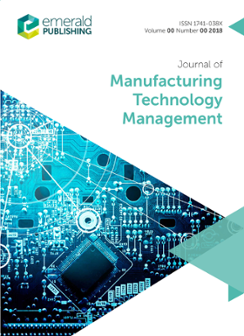通过技术动荡下供应链学习能力的发展解锁供应链产品和流程创新:来自埃及中小企业的证据
IF 7.3
2区 工程技术
Q1 ENGINEERING, INDUSTRIAL
引用次数: 4
摘要
目的鉴于当前商业环境中的挑战,企业,特别是那些参与供应链的企业,必须促进创新。在此背景下,本研究采用动态组织能力理论来跟踪供应链学习能力,并独立揭示其与产品和流程层面创新的关系。同样,本研究旨在调查技术动荡(TT)对这些关系的影响,作为一个调节变量。设计/方法/方法通过对埃及东部工业区中小型企业的189名具有一定供应链管理能力的首席执行官的面对面访谈收集数据。本研究采用调查方法收集数据,并采用SEM-PLS技术对数据进行分析。研究结果显示SCLC对产品和工艺创新有积极影响。此外,TT正向调节SCLC与产品和流程创新之间的关系,但风险承担能力除外。进一步的理论和实践启示来自研究结果。独创性/价值这项研究增加了动态能力理论(DCT)的知识,该理论影响企业如何与外部环境互动。学习学习能力被用作基本能力,以平衡外部环境中创新绩效方面的高水平TT,反之亦然,如果企业不试图加强其在供应链中的动态学习能力。此外,本研究通过从外部角度研究学习能力,为文献做出了贡献,其中SCLC被开发为一个新的变量,以提高创新能力。本文章由计算机程序翻译,如有差异,请以英文原文为准。
Unlocking supply chain product and process innovation through the development of supply chain learning capabilities under technological turbulence: Evidence from Egyptian SMEs
PurposeIn light of the current challenges in the business environment, firms, particularly those involved in supply chains, must foster innovation. In this context, the current study employs the theory of dynamic organizational capabilities (DOCs) to track supply chain learning capabilities (SCLCs) and independently uncover their relationship to innovation at both the product and process levels. Similarly, the study intends to investigate the influence of technological turbulence (TT) on these relationships as a moderating variable.Design/methodology/approachThe data were gathered using in-person interviews with 189 CEOs with some supply chain management proficiency from small and medium-sized enterprises (SMEs) in the industrial zones of eastern Egypt. The study used a survey approach to collect data, and the SEM-PLS technique was utilized to analyze the data.FindingsStudy findings revealed that SCLCs positively affect product and process innovation. In addition, TT positively moderates the relationship between SCLCs and product and process innovation, except for risk-taking capability. Further theoretical and practical implications are derived from the study findings.Originality/valueThis research adds to the knowledge of the dynamic capabilities theory (DCT), which affects how firms interact with their external environment. Studying learning capabilities are employed as essential competencies to counterbalance high levels of TT in the external environment in terms of innovative performance and vice versa if firms do not attempt to strengthen their dynamic learning capabilities in supply chains. In addition, this study contributes to the literature by studying learning capabilities from the external perspective, where SCLCs are being developed as a new variable to improve innovation.
求助全文
通过发布文献求助,成功后即可免费获取论文全文。
去求助
来源期刊

Journal of Manufacturing Technology Management
Engineering-Control and Systems Engineering
CiteScore
16.30
自引率
7.90%
发文量
45
期刊介绍:
The Journal of Manufacturing Technology Management (JMTM) aspires to be the premier destination for impactful manufacturing-related research. JMTM provides comprehensive international coverage of topics pertaining to the management of manufacturing technology, focusing on bridging theoretical advancements with practical applications to enhance manufacturing practices.
JMTM seeks articles grounded in empirical evidence, such as surveys, case studies, and action research, to ensure relevance and applicability. All submissions should include a thorough literature review to contextualize the study within the field and clearly demonstrate how the research contributes significantly and originally by comparing and contrasting its findings with existing knowledge. Articles should directly address management of manufacturing technology and offer insights with broad applicability.
 求助内容:
求助内容: 应助结果提醒方式:
应助结果提醒方式:


